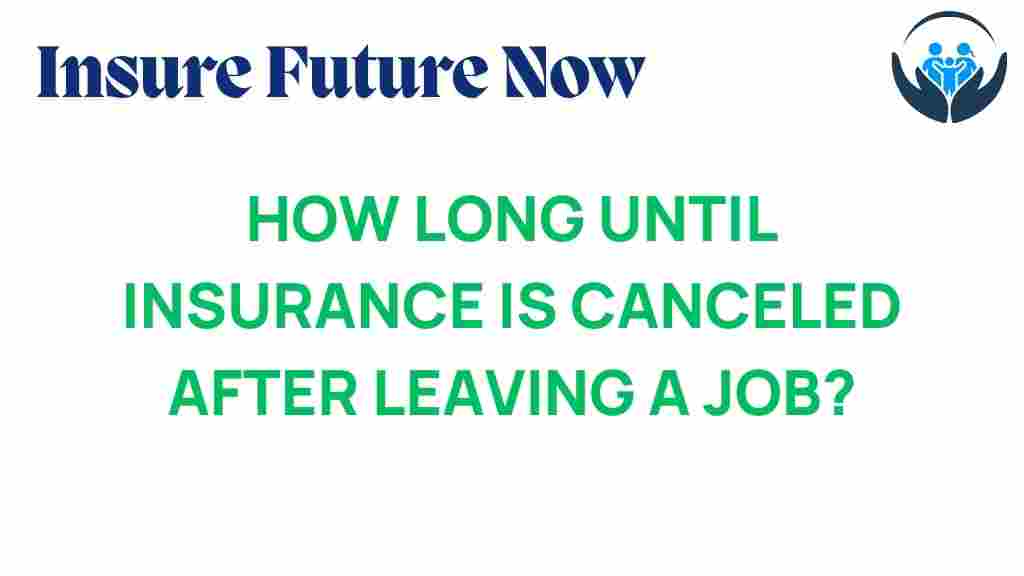How Long Does Insurance Last After Leaving Your Job?
Experiencing job loss can be overwhelming, and understanding how long your insurance lasts after leaving your job should be one of your top priorities. Health insurance is essential for maintaining your well-being, and knowing your coverage duration can help you navigate this challenging time. In this article, we will uncover the timeline of insurance coverage after employment termination, explore options like COBRA, and discuss various insurance options available to you.
The Timeline of Insurance Coverage Duration After Job Loss
When you leave your job, either voluntarily or involuntarily, your employer-sponsored health insurance typically ends on your last day of employment. However, the exact timeline can vary based on several factors, including your employer’s policies and the type of insurance you have. Here’s a breakdown of what to expect:
1. Immediate Termination of Coverage
In most cases, your health insurance coverage through your employer will cease on the last day of the month in which your employment ends. For example, if you leave your job on March 15, your health insurance may remain active until March 31. However, this is not universal, and you should verify with your employer’s HR department for specific details.
2. COBRA Insurance
If you lose your job and your employer had 20 or more employees, you may be eligible for COBRA (Consolidated Omnibus Budget Reconciliation Act) coverage. This federal law allows you to continue your employer-sponsored health insurance for a limited period after job loss.
- Coverage Duration: COBRA coverage can last for up to 18 months after your employment ends. In some circumstances, it can extend to 36 months.
- Eligibility: To qualify for COBRA, you must have been enrolled in your employer’s health plan and your employer must offer it.
- Cost: You will typically pay the full premium plus a 2% administrative fee, which can be significantly higher than what you paid while employed.
3. Transition to New Insurance Plans
As your COBRA coverage approaches its end, or if you choose not to enroll in COBRA, it’s crucial to explore other health insurance options. Here are some alternatives:
- Marketplace Insurance: You can apply for health insurance through the Health Insurance Marketplace. Losing your job qualifies you for a Special Enrollment Period.
- Medicaid: Depending on your income level, you may qualify for Medicaid, which provides low-cost or free health coverage.
- Short-term Health Insurance: If you need temporary coverage while searching for a new job, short-term health insurance plans may be an option. However, they often have limited benefits.
Understanding Policy Changes
When you leave your job, it’s essential to understand how this affects your health insurance policy. Here are some key points regarding policy changes:
1. Coverage Limits and Exclusions
While on COBRA or any new health insurance plan, be aware of any limits or exclusions that may apply. Some common exclusions include:
- Pre-existing conditions (though most plans must cover these under the Affordable Care Act)
- Specific treatments or medications
2. Premium Increases
When transitioning to a new policy, you may face higher premiums than you were paying through your employer. It’s essential to budget accordingly and consider all available options to find a plan that fits your financial situation.
3. Open Enrollment Periods
Keep an eye on open enrollment periods for health insurance plans. This is your opportunity to enroll in a new plan if you missed the Special Enrollment Period following your job loss.
Dealing with insurance options after job loss can be daunting. Here are some troubleshooting tips to help you navigate the process:
1. Communicate with Your Employer
Contact your HR department promptly to clarify the specifics of your insurance coverage termination and your eligibility for COBRA. Understanding your rights and options is crucial.
2. Compare Plans Thoroughly
Take the time to compare various health insurance plans, including premiums, deductibles, and network coverage. Utilize resources like healthcare.gov to guide you through the comparison process.
3. Seek Expert Advice
If you feel overwhelmed, consider consulting with an insurance broker or financial advisor. They can provide personalized advice based on your unique situation.
4. Monitor Enrollment Deadlines
Whether you’re considering COBRA or Marketplace options, be vigilant about enrollment deadlines. Missing these deadlines can limit your options significantly.
Conclusion: Securing Your Health Insurance After Job Loss
In summary, understanding how long your insurance lasts after leaving your job is crucial for ensuring your health and financial stability. While your employer-sponsored coverage typically ends on your last day of work, options like COBRA can provide temporary relief. It’s vital to explore all available insurance options, compare plans, and be aware of enrollment periods to secure the best coverage for your needs.
Job loss is a challenging experience, but with the right knowledge and resources, you can navigate the transition smoothly. For more information on health insurance options after employment termination, feel free to check out this helpful resource.
This article is in the category Coverage and created by InsureFutureNow Team
